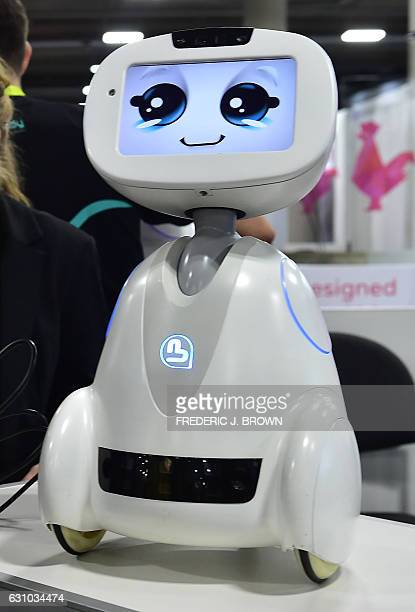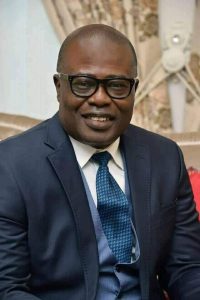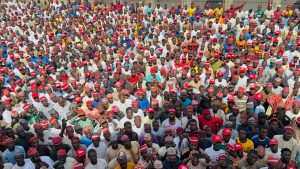
Buddy, the companion robot from Blue Frog, on display on the showroom floor at the 2017 Consumer Electronics Show in Las Vegas, Nevada, on January 5, 2017. The robot provides the opportunity for entertainment, security, elderly care and a smart home. / AFP / Frederic J. BROWN (Photo credit should read FREDERIC J. BROWN/AFP via Getty Images)
Businesses are rethinking how to move goods and people around the planet.
Imagine: A humanoid robot in every household, ready to fulfill our every want and whim. Chores like tidying up, making dinner, and mowing the lawn could be outsourced to AI robot butlers that have total knowledge of every family member, room, and object in the home.
That’s a vision of the near future that Elon Musk outlined at the TED conference this week. The Tesla CEO and Twitter’s wannabe owner said an “interesting prototype” of a robot he’s been developing will be ready this year. He expects production of Tesla Optimus, as it’s called, to start within two years; and mass adoption to occur in under a decade.
“People have no idea; this is going to be bigger than a car,” he said in an interview with TED curator Chris Anderson filmed at Tesla’s new battery and electric vehicle factory in Austin, Texas.
Musk says he’s cognizant that having robots with intimate knowledge of every aspect of our lives can lead us down dystopian roads, so he’s implementing safety features like a localized computer chip that can’t be updated remotely; and quick commands that will instantly deactivate it. “Mechanically, it will be slow enough so you can run from it, and most likely overpower it,” Musk said when he publicly introduced Optimus last August.
Musk adds that he believes that designing robots to be as human-like as possible will deter the AI from going amok. “It’s a risk, I agree,” said Musk responding to Anderson’s probe about unintended consequences of having fleets of Tesla bots running our homes. “I’m not saying that I have a certain answer to that risk. What I’m just saying is that maybe one of the things that would be good for ensuring the future is one that we want, is to couple the collective human will to digital intelligence.”
“We’re already a cyborg, if you think about it. The computer is an extension of ourselves,” he said. (Musk also revealed that Tesla is in the early stages of developing a computer chip that could be implanted in human brains to achieve the a full symbiosis between machines and humans.)
Perfecting Tesla’s AI for self-driving cars
Putting a robot in every household, is in part, meant to help Tesla perfect its autonomous vehicle technology AI. In 2017, Musk said that his driverless vehicles would be able to travel from Los Angeles to New York City without incident by the end of that year. His prediction didn’t happen because the artificial intelligence didn’t develop as quickly as he’d hoped.
“It took me a while to realize that in order to solve self-driving, you really need to solve real-world AI,” Musk said. “The point you solve for a car—which is really a robot in four wheels—you can just then generalize that to a robot on two legs.”
Musk says the first versions of Optimus will be worker bots that can perform jobs that are “dangerous, boring, and repetitive.” He brushed away concerns that the bots will take jobs away from humans. “I wouldn’t worry about putting people out of the job thing,” Musk said. “We’re actually going to have and already do have a massive shortage of labor.”
Qz.com




前往Telegram下载,了解这款注重隐私的即时通讯应用。体验其安全、快速和便捷。